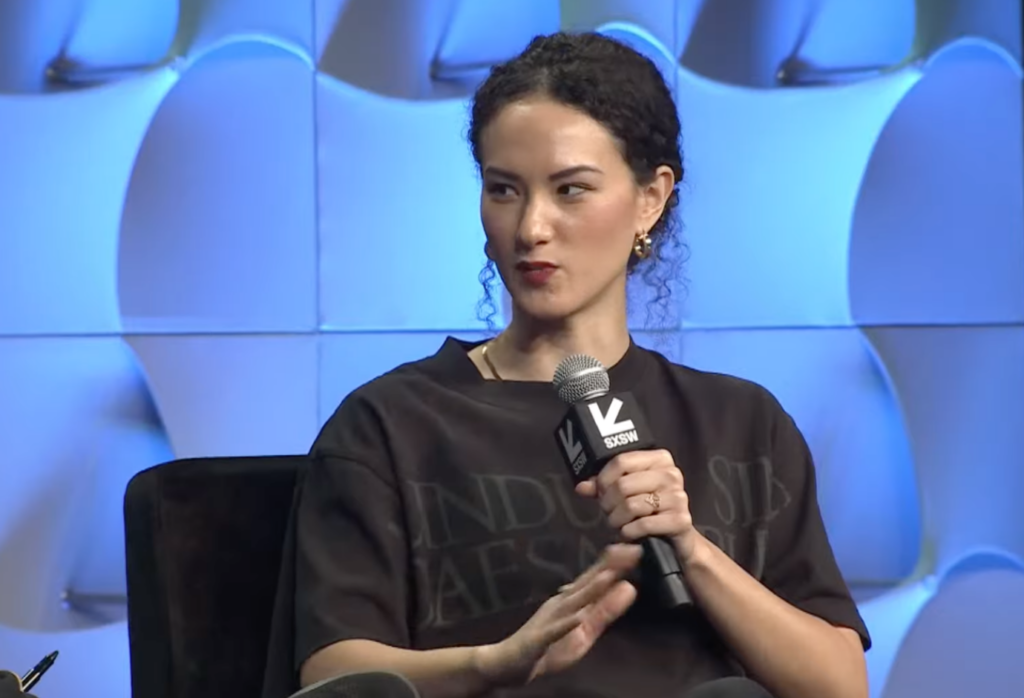The CEO of one of the world’s fastest growing social media platforms made a bold and widely applauded statement when she took to the stage at SXSW wearing a simple, black T-shirt with the phrase: “Mundus sine caesaribus,” which is Latin for “a world without Caesars.”
The gesture, made by 34-year old Bluesky CEO Jay Graber was clearly a dig at Meta CEO Mark Zuckerberg, who wore a shirt of the same colour and typeface while delivering his keynote at the Meta Connect conference last September – only his shirt said: “Aut Zuck aut nihil” a play on the ancient Latin phrase, “aut Caesar aut nihil” which translates to “either Caesar or nothing.”
Hours after Graber appeared on stage wearing the shirt, her company began selling it online at $40, with proceeds going to the AT Protocol developer ecosystem, the open network that Bluesky is built upon.
Thirty minutes later, the shirts were completely sold out (and remain out of stock), according to according to Emily Liu, Bluesky’s spokesperson and head of special projects.
“Jay wore the shirt onstage at SXSW to emphasize Bluesky’s democratic approach, where a single CEO or company doesn’t control your experience online — and looks like people resonated with that vision,” Liu said in an email to Business Insider.
During her appearance in Austin last week, Gerber spoke to audiences about Bluesky, insisting that it was not just another social media app but a structural alternative to bigger platforms.
“The key to what we’re doing is shifting power back to users and developers,” Graber said. “If a billionaire came in and bought Bluesky, or took it over, or if I decided tomorrow to change things in a way that people really didn’t like, then they could fork off and go on to another application.”
“There’s already applications in the network that give you another way to view the network, or you could build a new one as well,” she continued. “And so that openness guarantees that there’s always the ability to move to a new alternative.”
Mani Thiru, Space Industry Development Lead Asia Pacific at Amazon Web Services, praised Graber’s fashion statement, describing it as “[not] just a petty swipe at a much larger competitor” but a move that “represents the ethos that Bluesky is trying to live up to.”
“Exactly the kind of energy we need for the times,” she wrote on LinkedIn. “Though it’s tiny compared to Meta’s empire, Bluesky’s billionaire-proof, decentralised, open source infrastructure imagines a form of social media where no single entity holds all the power (unlike X or Meta). Users have more control over their data, privacy, and the content they see. And it creates the opportunity for any developer to contribute to the platform’s growth.”
Lauched in 2023 as an invite-only platform, Bluesky was founded by Jack Dorsey in 2019 to be a decentralised network built on an open source framework that gives users more transparency regarding how it’s being built — a move away from platforms such as Zuckerberg’s Facebook and Elon Musk’s X (formerly Twitter).
Bluesky said it will not run ads, instead, will make money via subscriptions, with users paying a regular fee to do things such as upload higher-quality video or access specific customisation features. Users can also adjust what they see through user lists, muted words and starter packs.
The platform quickly became the popular alternative to X, especially after the US presidential election last year. According to the company, in January this year, 30 million new users registered. Since then, the numbers have risen to over 33 million users. According to Graber, several professional community groups are hopping onto the platform, including developers, artists, journalists, scientists, and “people who are interested in trying out new social modalities.”
Speaking to TechDirt’s editor Mike Masnick last week in Austin, Graber said the company has faced several challenges so far, including the strain of building a user social app that maintains what people like about social media, while scaling up on an open protocol.
“Every time you grow by an order of magnitude, you have to rethink how you’re doing things both organisationally and technically,” she said.
“At every stage, we’ve made sure that we have grown things in such a way that we preserve openness while scaling up.”
Graber began her career as a digital policy activist, shifting to become a programmer in 2018.
Building open networks is a top priority for the CEO, telling Masnick last week, “It’s very critical to the problems we face in the world.”
“If you have an open network, then you have a form of communication that people can modify and make their own.”
Follow Women’s Agenda on Bluesky.



